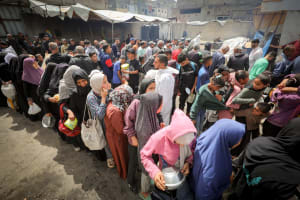Collapse of civilian infrastructure in Rafah, IDF increases evacuations and security buffer zones across Gaza Strip
Hamas officials admit that IDF strikes on leadership are effecting terror group’s ability to operate

After several months of operations on the northern front, along the Lebanon border, the troops of the Golani Brigade, under the command of the 36th Division, have recently returned to the Gaza Strip.
In the past week, Golani troops have operated in the Rafah area in order to locate and dismantle remaining terrorist infrastructure in the area, including buildings used by terrorists, and observation and firing positions.
The Israel Defense Forces (IDF) is slowly broadening its operations in the Gaza Strip. On Monday, IDF Arabic Spokesperson Colonel Avichay Adraee, reiterated his call for Gaza residents to evacuate neighborhoods in Deir al-Balah, in the central Gaza Strip.
“We repeat our urgent warnings to all residents of the Gaza Strip present in the Deir al-Balah area in the neighborhoods: Al-Sahaba, Al-Samah, Al-Awda, Al-Zawaida and Al-Salah,” Adraee posted to social media. “This is a final advance warning before the strike! We will attack with extreme force every area used for launching rockets.”
“Terrorist organizations, primarily Hamas, bear full responsibility for the displacement and suffering of civilians,” Adraee stated. “For your safety, you must move immediately south to the known shelters in Al Mawasi.”
Most evacuation notices issued so far have been mainly to residents of Beit Hanoun and Jabaliya in the northern Gaza Strip, Rafah in the south, and Shejaiya, east of Gaza City, and in the past two days, to Gazans in Deir al-Balah, in the central Gaza Strip.
Also on Monday, IDF forces were spotted consolidating territory and building guard towers in parts of the Gaza Strip that they had retaken in recent days. This is part of a renewed offensive which has seen the IDF seize and clear large swathes of territory for constructing security buffer zones. The military has issued several evacuation warnings to hundreds of thousands of Gaza residents throughout the Gaza Strip since it resumed operations on March 18.
According to a report in Channel 7, Hamas recently declared Rafah to be a “disaster zone” due to the unprecedented destruction of civilian and public infrastructure. The report stated that around 90% of homes in Rafah have been completely destroyed, with massive damage to civil infrastructure including roads, wells, and sewage.
The Qatari-affiliated news outlet Al-Asharq Al-Awsat reported yesterday that the recent assassinations of senior Hamas government officials has led to an administrative vacuum in the Gaza Strip and harmed Hamas' management over the territory, including causing delays in the payment of the salaries of Hamas officials.
The Lebanon based Al-Akhbar newspaper cited an unnamed Hamas official who said that police and Hamas government officials are also targets of assassination.
Many of the Gaza residents have expressed extreme frustration with their situation, due to the widespread destruction, the repeated evacuations, and the lack of income.
Muhammad Sheikh, a resident of Rafah, told Al-Asharq Al-Awsat that he is tired of constant evacuation.
“This is the eighth time we have evacuated,” Sheikh told the Arab news channel. “My house was bombed and my mother was killed. My wife and three of my daughters were injured – and then we decided to evacuate to Khan Yunis, where we moved from one refugee shelter to another until we returned to Rafah. We set up a tent over the ruins of our house, and after a month or a month and a half, the situation returned to what it was and worse, and since then – from evacuation to evacuation. In my life I have never been as exhausted as I have been in the past year and a half.”
Ahmad Kawara, another resident of Rafah, told Asharq Al-Awsat about how exhausted he is, saying he is thinking about voluntary emigration from Gaza.
“We are again rebuilding our lives in a tent, we are going to deal with the disasters of the lack of water and food. Ever since I was born, I've lived only through wars. War after war, and there is nothing more difficult than our homes being destroyed,” Kawara said. “We're exhausted from this life and it's better for us to die. We want calm and for the war to stop. The people are exhausted, emigration from the Gaza Strip is better than living there. I hope that my family and I will get out of the Gaza Strip so that we can calm down from the difficult things in this life, evacuation after evacuation. I am determined to leave the Gaza Strip after the war.”
Meanwhile, six UN aid organizations, including UNICEF, the World Health Organization, and UNRWA, issued a joint warning of an impending humanitarian collapse in Gaza. According to the organizations, the month-long embargo on goods and aid is leading to a crisis.
“Claims that there is enough food for all Palestinians in Gaza are far from the reality on the ground, and stocks are running out rapidly,” the statement by the organizations read. “This is a complete disregard for human life.”
The IDF maintains that the increased amount of humanitarian aid entering during the most recent hostage-ceasefire deal, means that there there are still sufficient supplies for the population provided Hamas does not hoard the aid intended for the civilian population.

The All Israel News Staff is a team of journalists in Israel.
You might also like to read this:

















